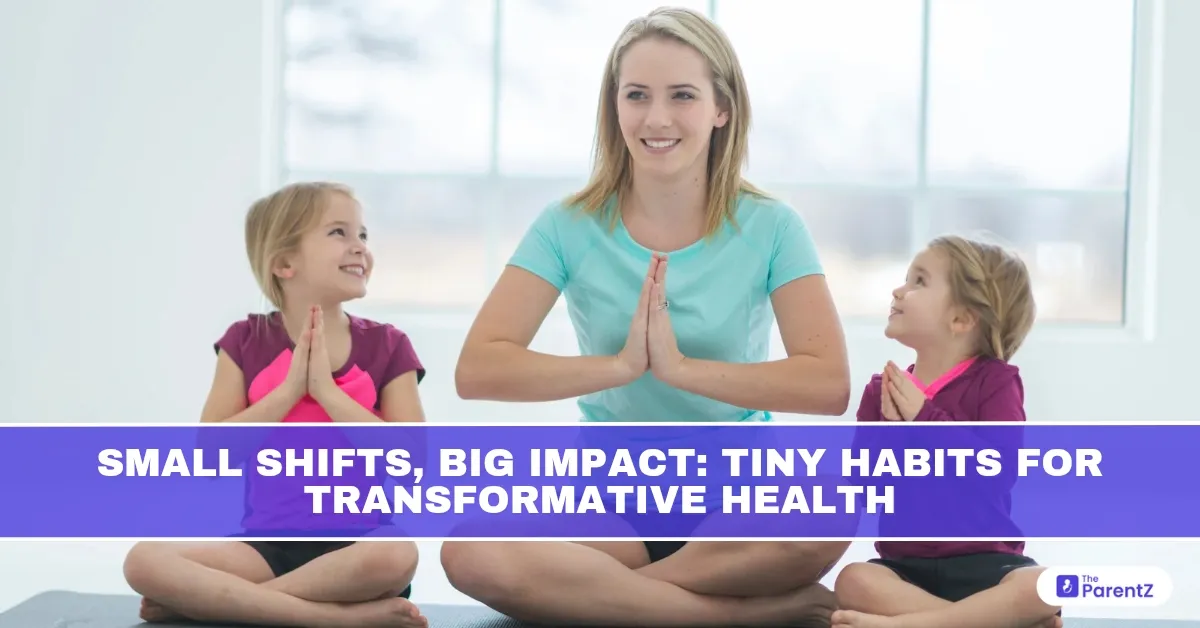In our fast-paced world, we often think that achieving better health requires big, dramatic changes. But what if the key to lasting health transformations lies in small, consistent habits? Tiny changes to your daily routine can have a profound impact on your physical, mental, and emotional well-being. The power of these small shifts lies in their simplicity and ease of implementation, making them sustainable in the long term.
Start Your Day with Water
One of the simplest yet most effective habits you can adopt is drinking a glass of water first thing in the morning. After hours of sleep, your body is dehydrated, and replenishing fluids helps kickstart your metabolism and hydration levels.
How It Helps:
- Boosts hydration, improving skin health and digestion.
- Increases energy levels and helps reduce fatigue.
- Supports cognitive function and mental clarity throughout the day.
How to Implement:
Keep a glass or bottle of water by your bedside table, so it’s the first thing you reach for when you wake up. It’s a quick habit that can have lasting effects on your overall health.
Take Short Walks Throughout the Day
We all know that exercise is essential for good health, but finding time for a full workout can be challenging. Instead of setting aside an hour for the gym, try taking short walks throughout your day. A 10-minute walk after each meal, or simply walking around your home or office for a few minutes every hour, can significantly improve circulation, boost mood, and support metabolism.
How It Helps:
- Reduces the risk of chronic conditions like heart disease and diabetes.
- Enhances mood and reduces stress by releasing endorphins.
- Improves digestion and supports weight management.
How to Implement:
Set an alarm or reminder to take a walk at regular intervals, such as after meals or every hour. If you’re at home, walk around the house, or if you’re at work, take a brisk stroll around the office or outside. Even these small bursts of movement can add up over time.
Mindful Eating
In our busy lives, it’s easy to eat on autopilot, rushing through meals without paying much attention to what or how much we’re eating. Practicing mindful eating can make a significant difference in how your body processes food, helping to prevent overeating and improve digestion.
How It Helps:
- Promotes healthy digestion by chewing food properly.
- Helps regulate weight by preventing overeating and emotional eating.
- Increases satisfaction and enjoyment from meals.
How to Implement:
Before you eat, take a moment to appreciate the food in front of you. Eat slowly, savoring each bite, and avoid distractions like screens or multitasking. Focus on your body’s hunger and fullness cues, and stop eating when you feel satisfied—not stuffed.
Add Veggies to Every Meal
Increasing your intake of vegetables is one of the most powerful changes you can make for your health. Vegetables are nutrient-dense, packed with vitamins, minerals, and antioxidants that support your immune system, skin health, and energy levels.
How It Helps:
- Provides essential nutrients and supports overall health.
- Promotes digestive health due to their high fiber content.
- Helps maintain a healthy weight and reduces the risk of chronic diseases.
How to Implement:
Make it a goal to add at least one vegetable to each meal. This could mean tossing spinach into your morning smoothie, adding tomatoes to your sandwich, or having a side salad with dinner. Gradually increase the variety of vegetables in your meals, making them a central part of your diet.
Practice Deep Breathing or Meditation
Taking a few moments each day for deep breathing or meditation can have profound effects on your mental and emotional well-being. It’s an excellent way to reduce stress, clear your mind, and cultivate mindfulness.
How It Helps:
- Reduces stress and anxiety by activating the parasympathetic nervous system.
- Improves focus, clarity, and mental resilience.
- Enhances emotional health by promoting a sense of calm and balance.
How to Implement:
Start with just 5 minutes of deep breathing or meditation each day. Find a quiet space, close your eyes, and focus on your breath. Breathe deeply, counting each inhale and exhale. If you prefer guided meditation, use apps like Headspace or Calm. Even a few minutes a day can have lasting benefits.
Prioritise Sleep
In today’s hustle culture, sleep often takes a backseat, but it’s one of the most powerful habits you can cultivate for overall health. Small changes in your bedtime routine, like reducing screen time before bed or establishing a consistent sleep schedule, can significantly improve the quality of your sleep.
How It Helps:
- Supports cognitive function and emotional well-being.
- Boosts the immune system and helps the body repair itself.
- Enhances mood and energy levels, preventing fatigue and irritability.
How to Implement:
Set a regular bedtime and aim for 7-9 hours of sleep each night. Reduce your exposure to screens at least 30 minutes before bed and try reading a book or practicing relaxation techniques instead. Consistency is key to improving your sleep quality over time.
Swap Sugary Drinks for Water or Herbal Tea
Sugary drinks like sodas, energy drinks, and sweetened coffee can contribute to weight gain, poor digestion, and energy crashes. By swapping them out for water, herbal teas, or infused water, you can reduce sugar intake and stay hydrated without the added calories.
How It Helps:
- Reduces the risk of obesity, diabetes, and other metabolic conditions.
- Supports hydration and better digestion.
- Helps maintain steady energy levels throughout the day.
How to Implement:
Start by replacing one sugary drink a day with water or herbal tea. Try infusing your water with fruit or herbs for added flavor without the sugar. Gradually reduce your intake of sugary beverages and watch your energy and health improve.
Declutter Your Space
Physical clutter can contribute to mental clutter, making it harder to focus and increasing feelings of stress and anxiety. Taking small steps to declutter your living or working space can help create a more peaceful, organised environment, leading to better mental clarity and reduced stress.
How It Helps:
- Reduces stress and anxiety by creating a calming, organized environment.
- Improves focus and productivity by minimizing distractions.
- Promotes a sense of accomplishment and well-being.
How to Implement:
Start by decluttering one area of your home or workspace each week. Organize your desk, tidy up your bedroom, or clean out a closet. Maintaining a clutter-free environment will help promote a sense of calm and order.
Conclusion
Transforming your health doesn’t require radical changes or immense willpower. By making small, intentional shifts in your daily habits, you can experience significant improvements in your physical, mental, and emotional well-being. The key is consistency—tiny habits, practiced over time, can create lasting results. So, start today by incorporating a few of these small changes into your routine and enjoy the big impact they bring to your health.





Be the first one to comment on this story.